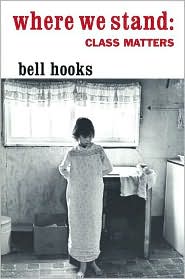In “Coming
to Class Consciousness” bell hooks describes various aspects of class
consciousness as well as classism. She opens with a description of her
childhood desires and the ways in which her parents, particularly her mother,
would dismiss those desires (especially when these desires would cause a
monetary strain on the family). Opening with this allowed the reader to
immediately be clued in on particular family values of hooks’, and it helps the reader to better understand future events (such as her parents disinterest in hooks’ desire to attend Stanford).
immediately be clued in on particular family values of hooks’, and it helps the reader to better understand future events (such as her parents disinterest in hooks’ desire to attend Stanford).
 This
chapter is not simply memoir style anecdotes upon anecdotes. Although this text
is far less theoretical than much of the essays put forth by hooks, we are able
to pick up on a lot of characteristics relating to Class (big C class as in the
concept). When describing her first White friend at the women’s college she
originally attended hooks notes that her fellow working-class friend had not
just anger and bitterness towards the more privileged girls but also envy.
Hooks notes that “envy was always something I pushed away from my psyche. Kept
too close for comfort envy could lead to
infatuation and on to desire. I desired nothing that they had” (26). This passage, as well as a later one which
describes her self-hating working-class roommate at Stanford, highlights
internalized classism.
This
chapter is not simply memoir style anecdotes upon anecdotes. Although this text
is far less theoretical than much of the essays put forth by hooks, we are able
to pick up on a lot of characteristics relating to Class (big C class as in the
concept). When describing her first White friend at the women’s college she
originally attended hooks notes that her fellow working-class friend had not
just anger and bitterness towards the more privileged girls but also envy.
Hooks notes that “envy was always something I pushed away from my psyche. Kept
too close for comfort envy could lead to
infatuation and on to desire. I desired nothing that they had” (26). This passage, as well as a later one which
describes her self-hating working-class roommate at Stanford, highlights
internalized classism. The envy that her White friend had was only possible because of an internalized belief that middle/upper class positionality was the superior position. This kind of internalized belief can manifest in a variety of ways. For this particular girl it manifested as envy. For the Stanford roommate it manifested as a passionate desire to “climb-the-ladder” even if that meant putting self-care and safety on the back burner.
Another
moment in which hooks’ addresses internalized classism is when she discusses “class
shame”, using the example of her own mother’s refusal to discuss monetary
difficulties (28). Much like the manifestation of envy, class shame can only
occur when one views their class position as inferior in comparison to other
class positions.
An
important aspect of the text is hooks’ discussion of the neo-colonial elite.
She rightly points out that there are plenty of Black folk, particularly the “Black
elite” who harness the same type of classism and feelings of class superiority
that the White hegemonic group possesses. It’s unfortunate that this isn’t
brought up until much later in the chapter, I have no doubt it’s meditated on
more closely in later chapters but those later chapters are not the topic of
discussion. There is so much complexity involved when discussing the
neocolonial Black and brown elite, it’s something that deserves a great deal of
attention. I appreciate the fact that hooks’ closes with a note on her own need
to be self-reflective lest she become a colonized elite herself.
